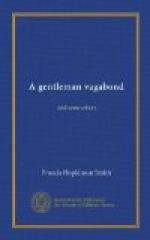And the strange dog, gentleman as he was, expressed himself as entirely satisfied with the very free and generous explanation. With tail wagging more violently than ever, he assured the concierge that he understood his position exactly. Then wheeling suddenly, he bounded down the road. Though convinced, he was still anxious.
Then the concierge gravely settled himself once more on his haunches in his customary place, his eyes commanding the view up and down and across the road, where I sat still tilted back in my chair waiting for my cutlets, his whole body at rest, his face expressive of that quiet content which comes from a sense of duties performed and honor untarnished.
But the stranger had duties, too; he must answer the whistle, and find his master. His search down the road being fruitless, he rushed back to the concierge, looking up into his face, his eyes restless and anxious.
“If it were inconsistent with his honor to permit him to cross the threshold, was there any other way he could get into the coffee-room?” This last with a low whine of uneasiness, and a toss of head.
“Yes, certainly,” jumping to his feet, “why had he not mentioned it before? It would give him very great pleasure to show him the way to the side entrance.” And the St. Bernard, everything wagging now, walked with the stranger to the corner, stopping stock still to point with his nose to the closed door.
Then the stranger bounded down with a scurry and plunge, nervously edging up to the door, wagging his tail, and with a low, anxious whine springing one side and another, his paws now on the sill, his nose at the crack, until the door was finally opened, and he dashed inside.
What happened in the coffee-room I do not know, for I could not see. I am willing, however, to wager that a dog of his loyalty, dignity, and sense of duty did just what a dog of quality would do. No awkward springing at his master’s chest with his dusty paws leaving marks on his vest front; no rushing around chairs and tables in mad joy at being let in, alarming waitresses and children. Only a low whine and gurgle of delight, a rubbing of his cold nose against his master’s hand, a low, earnest look up into his face, so frank, so trustful, a look that carried no reproach for being shut out, and only gratitude for being let in.
A moment more, and he was outside again, head in air, looking for his friend. Then a dash, and he was around by the archway, licking the concierge in the face, biting his neck, rubbing his nose under his forelegs, saying over and over again how deeply he thanked him,—how glad and proud he was of his acquaintance, and how delighted he would be if he came down to Vienna, or Milan, or wherever he did come from, so that he might return his courtesies in some way, and make his stay pleasant.
Just here the landlord called out that the cutlets and coffee were ready, and, man-like, I went in to breakfast.




